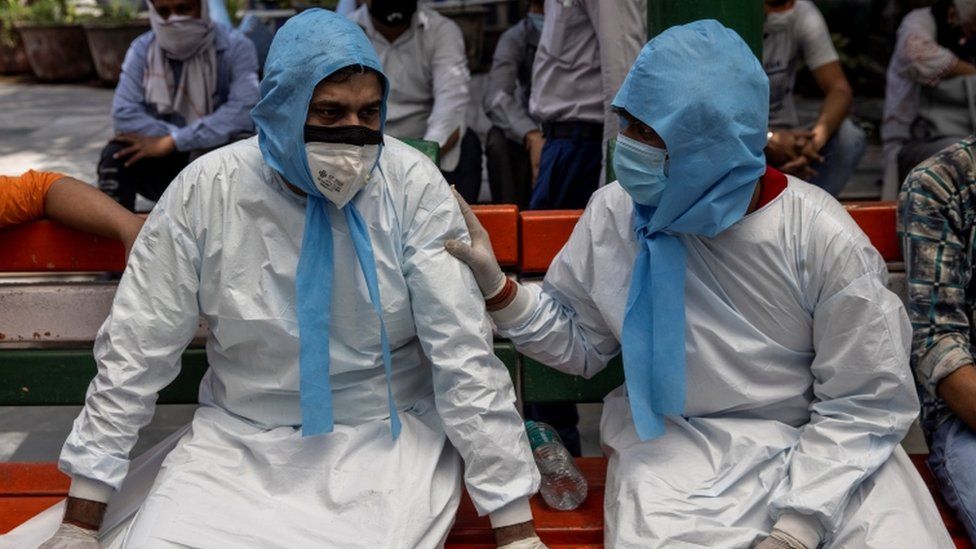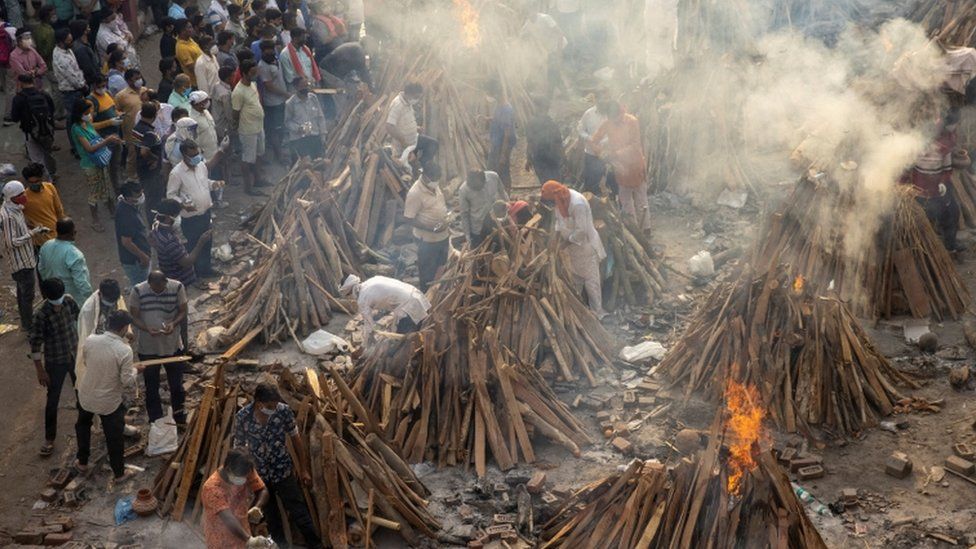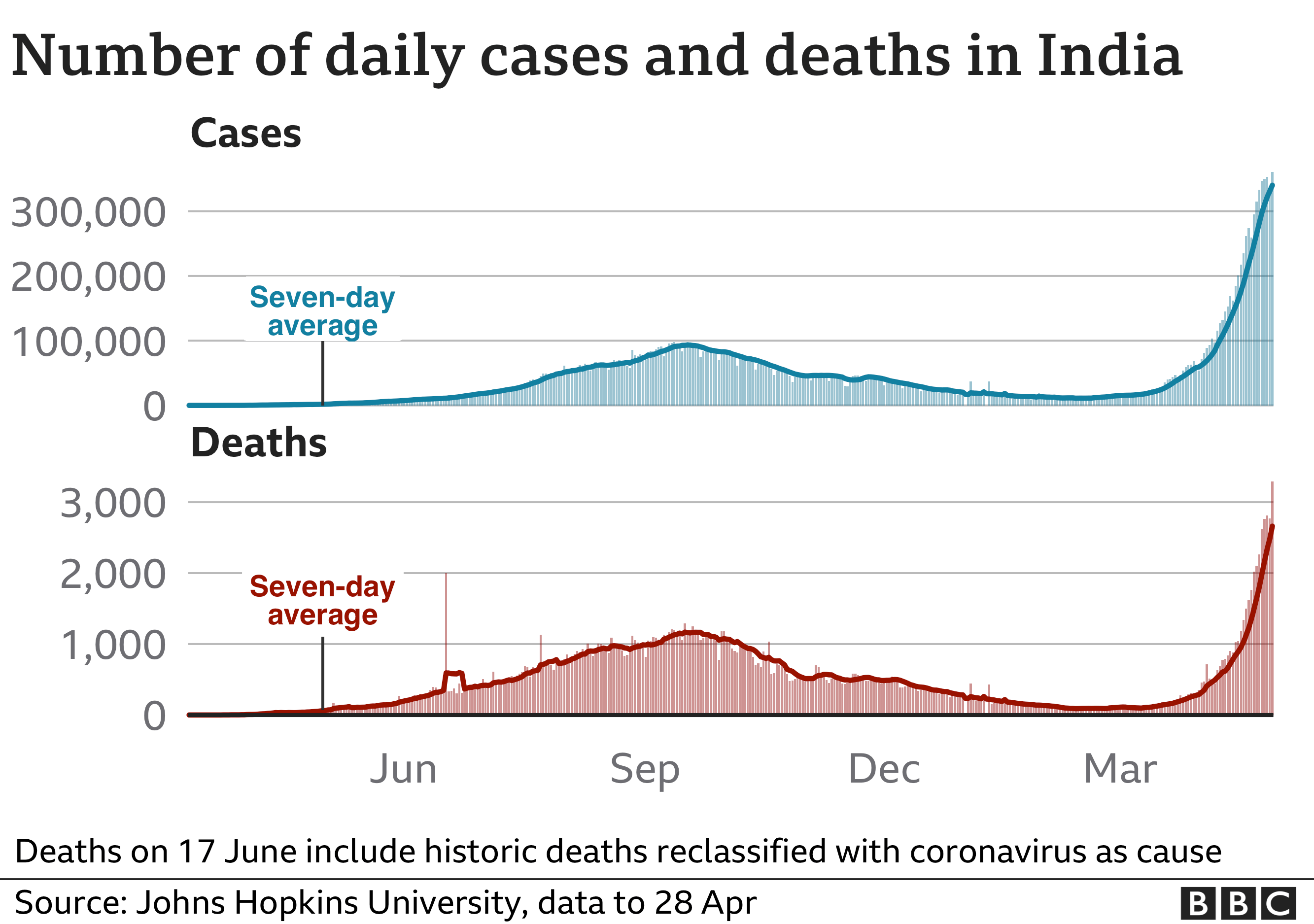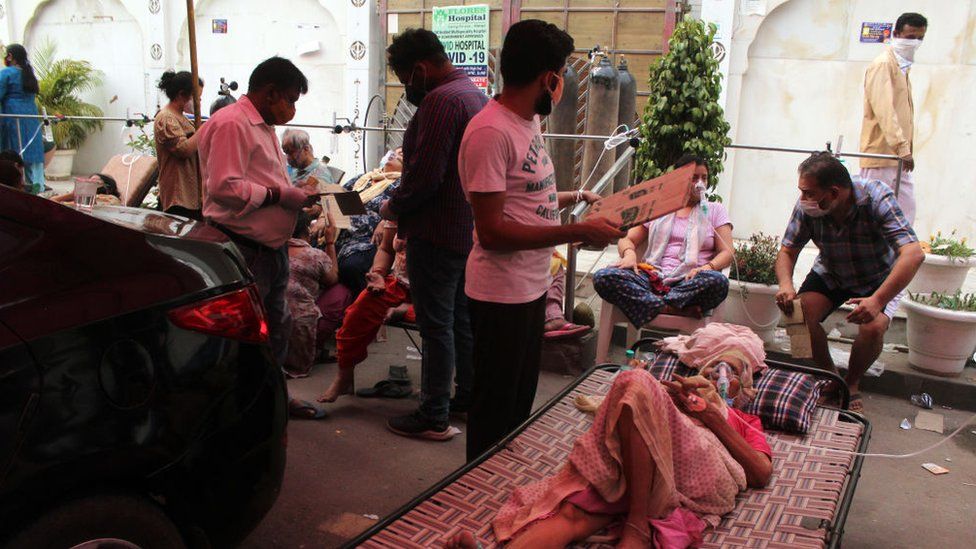
India has reached the devastating figure of 200,000 coronavirus deaths, with the pressure on many hospitals showing no sign of abating amid a surging second wave.
The real number of fatalities is thought to be far greater, with many not being officially recorded.
Oxygen supplies remain critically low across the country, with the black market the only option for some people.
Crematoriums are operating non-stop, with makeshift pyres in car parks.
There have been at least 300,000 new infections every day in the past week, with more than 360,000 new cases in the past 24 hours on Wednesday. Overall, more than 17.9 million cases have been registered.
Foreign aid has started to arrive from the UK and Singapore. Russia, New Zealand and France have pledged to send emergency medical equipment, and even regional rivals Pakistan and China have put aside their differences and promised to help.
However, experts say the aid will only have a limited effect in a nation that has a population of 1.3 billion.
A government website where Indians can register for a vaccination programme crashed soon after it launched on Wednesday, as tens of thousands of people tried to access it.
And in the state of Assam, a 6.4 magnitude earthquake damaged hospitals which were already under intense strain. People ran from their homes and other buildings in panic.
Mortality data in India is poor and deaths at home often go unregistered, especially in rural areas. There are reports of journalists counting bodies at morgues themselves, to try to get a more accurate number.
In Uttar Pradesh, health officials said 68 people had died on one day earlier this month across the state. But a Hindi newspaper pointed out that officials also said there were 98 Covid funerals in the capital, Lucknow, alone.

One man in Uttar Pradesh was investigated for spreading a "rumour with an intent to cause fear or alarm" by asking for help to find oxygen for his sick grandfather on Twitter. It caused widespread anger, and the man could face jail.
Crematoriums continue to work throughout the night to keep up with the number of bodies arriving, and many families are facing long waits before their loved ones can receive funeral rites. Some say they were asked to help speed up the process by piling the wood themselves.
Perils of the black market
In the southern city of Bengaluru, one doctor told the BBC people were panicking. It is one of the worst-hit cities in India, with some estimates saying there are about 300 active Covid cases per square kilometre.
The BBC's Ashitha Nagesh spoke to the senior consultant at a government hospital, who asked to remain anonymous.
"We were not prepared for this second surge," the consultant said. "For the first surge it was well organised - as soon as we came to know [of the virus] everything was streamlined and we were much better prepared. This time there are more cases, it was more sudden, and the situation was not prepared for."
With most hospitals overwhelmed, families are having to find ways to treat loved ones at home. Many have turned to the black market, where prices of drugs such as remdesivir and tocilizumab, and oxygen cylinders, have soared.
But even in this market, supply is no guarantee, reports the BBC's Vikas Pandey in Delhi.
"I know a family that cobbled together money to buy the first three doses of remdesivir from the black market, but couldn't afford to get the remaining three as prices shot up further," our correspondent says. "The patient continues to be critical."
Some private jet companies have reported a spike in business, as people try to fly their sick relatives to other hospitals in India.
"It's basically families of patients who are looking to get into a hospital and are trying to see if there are any beds in other parts of the country," Ashish Wastrad, head of Air Charter Service's Mumbai office, says.
However, he said the company's planes were not properly equipped to carry Covid-positive patients.


The World Health Organization (WHO) reported in its weekly epidemiological update that there were nearly 5.7 million new cases reported globally last week - and India accounts for 38% of them.
It also said that the B.1.617 variant of the virus detected in India has a higher growth rate than other variants in the country, suggesting increased transmissibility.
India is carrying out the world's biggest vaccination drive, but less than 10% of the population has so far received an initial jab, and as infections continue to surge, there are concerns about meeting the demand.
The US is helping India with the raw materials it needs for vaccine production, after India's biggest vaccine maker, the Serum Institute of India, complained of shortages of specialised imports from the US.
Meanwhile, the first batch of the Russian vaccine, Sputnik V, is set to arrive in India on 1 May, The New Indian Express reports. It has not yet been revealed how many doses will be delivered.


A tragic sense of inevitability
By Rajini Vaidyanathan, BBC South Asia correspondent
It's a horror story on repeat. Every day this week I've woken up to messages from friends and family in India, begging for help.
Social media posts document the desperation. And it's not just in Delhi, it's in every corner of the country.
"Can anyone find a bed in Jaipur for a friend's father?"
"Who can help find some oxygen for a friend's grandmother in Uttar Pradesh?"
"There are no beds in Pune, what should we do?"
And sometimes the messages are even bleaker. "My neighbour died yesterday," a friend told me. "We couldn't get him a bed."
My friend, who passed away yesterday morning at 11:30 am still can't be cremated due to the queue. Still lying in the morgue. Positivity my foot.
— Aparna (@chhuti_is) April 28, 2021

Watching from afar, images of a broken India are hard to process.
Taxis have been turned into makeshift ambulances. Car parks have become crematoriums. Freedom has turned into fear.
"I worry I might get the virus while I walk my dog," another friend tells me, as she struggles through Delhi's ongoing lockdown.
Aid is starting to reach India from overseas. But not enough, as cases continue to swamp India. As the world looks on at the endless images of burning pyres, there's a tragic sense of inevitability.

Government under fire
India is heading towards state elections, and there is increasing anger towards both state authorities and the central government for the handling of the pandemic.
Prime Minister Narendra Modi has been accused of ignoring scientific warnings to participate in election rallies and allowing a massive Hindu festival to go ahead in northern India.
Dr Navjot Dahiya, the vice-president of the Indian Medical Association, called Mr Modi a "super spreader" who had "tossed all Covid norms in the air".
The prime minister said he had held three meetings on Tuesday to discuss ways to increase oxygen capacities and medical infrastructure, including the use of trains and military aircraft to speed up transport of oxygen supplies.
The BBC's Yogita Limaye says many people are asking why the military and disaster response teams have not been put on a war footing to build field hospitals.
"There is a sense of abandonment in the country, of people being left to fend for themselves," our correspondent reports.
State and union territory governments, from Delhi to Karnataka, have been criticised for allowing Covid protocols to lapse and failing to prepare for what epidemiologists say was an inevitable surge in infections.
https://ift.tt/3b4gfHV
World
Bagikan Berita Ini














0 Response to "India Covid: Hospitals overwhelmed as deaths pass 200000 - BBC News"
Post a Comment